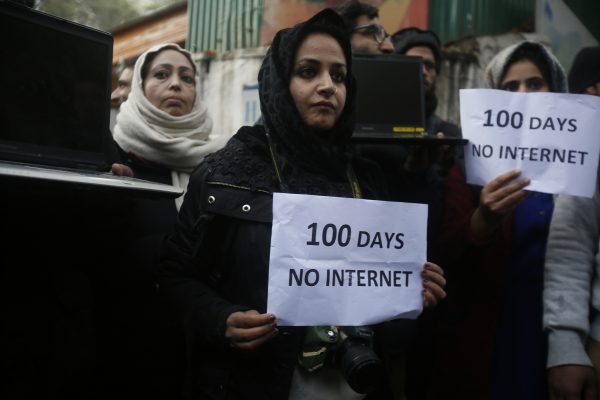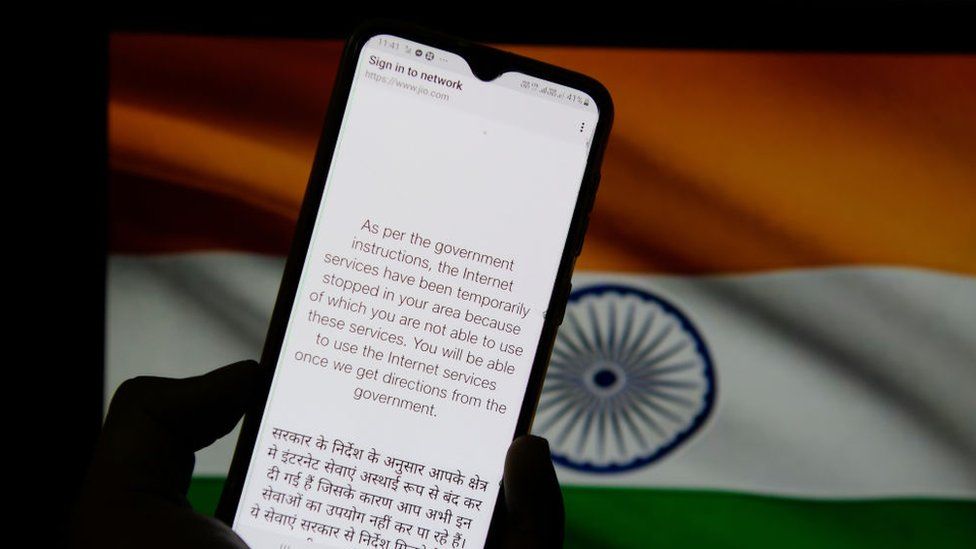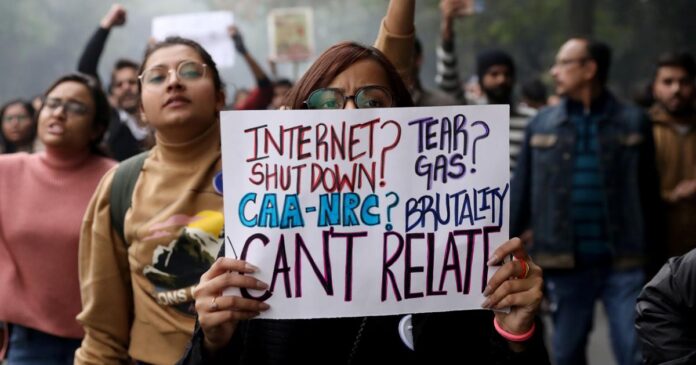The rising incidents of internet shutdown in India:
Internet shutdown means a deliberate suspension of internet services in a limited area, for a given amount of time, usually on the orders of the government. As per a report by the News Click, in 2016 and 2017, India reported the highest number of internet shutdowns in the world. Scroll reported in April 2018 that six states, including West Bengal, Jammu and Kashmir, Uttar Pradesh, Madhya Pradesh, Punjab and Rajasthan, had issued shutdown orders to deal with various law and order situations.
There have been various instances of internet shutdown in the past by the state and central government. Rajasthan alone has witnessed a total of 37 internet halts in the last two years, with thrice within 22 days, as reported by Bloomberg. The reason cited behind the frequent internet shutdowns in Rajasthan was to curb the menace of cheating in state services recruitment examination. The perils that Jammu and Kashmir went through after the announcement of abrogation of Article 370 was unprecedented.
To the extent that even today, while you read this after three months, internet services have not regained normalcy in the valley. The government claims that it is planning to go back to a healthy state of connectivity in phases. The state authorities have been seen resorting to shutting down the internet at the most trivial of reasons. In July 2019 internet services were clamped in Meerut for a protest being organized against mob lynching by an organization named Bharat Bandh. On the mere basis of an altercation between a student and a journalist, internet services for the entire city came to a temporary shutdown.
In light of the ongoing curb on communications in Jammu and Kashmir, one Anuradha Bhasin has approached the Supreme Court. She challenges the internet shutdown in the valley post the announcement of abrogation of Article 370 on August 05. She has preferred a Public Interest Litigation [PIL] in the apex court challenging the said decision to have revoked internet connectivity services in the region for so long. Anuradha, a journalist by profession, has prayed before the apex court to know the provisions under which internet access was blocked in the state.
Even though the matter has reached the uppermost body in the country, the petitioner’s complaint that they have not been made aware of the orders of the shutdowns imposed. However, the foreign minister for the state, Subrahmanyam Jaishankar has tried to justify the decision taken by the government saying that it was done to avoid an outbreak of violence and terror activity in the valley. He told The Politico, an international media publication.

“How do I cut off communications between the terrorists and their masters on the one hand, but keep the internet open for other people? I would be delighted to know,”
Even before the Supreme Court, the government has taken the defence that it has learned from experience that through the internet as a medium, violence and terror operations are instigated and executed. If you rely on the experts in this question of a blanket ban on internet services of a region, they agree that it might be necessary in some situation but only coupled with a reasoned order through a transparent process.
However, how the entire episode unfolded before and after August 05, let along with transparency, there was no accountability, and the masses of the nation were threatened in the name of ‘terror suspicion’. The valley was clamped with additional army forces and was forced to stay in their houses with no connectivity whatsoever, let alone the internet.
Statistics from the Software Freedom Law Centre speaks that from 2012 to 2018, the number of internet shutdowns in India has jumped from three to 134. In the year 2019 alone, there have been a total of 77 reported incidents of internet shutdowns in the country. Apart from depriving the masses of connectivity, the economic impact of such a move is also worrisome. According to a think tank, Indian Council for Research on International Economic Relation s, the cost of internet shutdowns in the country from 2011 to 2017 was approximately Rs. 21,336 crore.
The inflated figure is said to be ‘a conservative estimate’ by the director-general at telecom industry body Cellular Operators Association of India. He also said that the act of shutting down the internet is a ‘blunt instrument’, to be used precariously. An internet shutdown has various impacts on the lives of the people in today’s connected world. Everything from transportation to banking is linked to internet connectivity, and its absence can affect the daily lives of the people.
It is for this reason that such a decision to go ahead with an internet shutdown should be the last resort, more ‘surgical’ as often suggested by experts. Also, for administrative reasons, such as cheating in exams, the first alternative should be to look at other options of achieving the result and not go for a state-vide internet shut down.
The law regulating internet shutdowns in a country is relatively new. It was only two years back that a legal basis was given to the shutdowns, despite a rise in the number of such incidents. Before 2017, any order by the district magistrate to shut down fell under Section 144 of the Code of Criminal Procedure. So using the given section, the district magistrates would use their power to ‘issue directions to maintain public order’ under their jurisdiction. In 2017, the Centre came up with a new set of rules under the Indian Telegraph Act, 1885 known as the Temporary Suspension of Telecom Services (Public Emergency or Public Safety) Rules.

As per the provisions of the Temporary Suspension of Telecom Services (Public Emergency or Public Safety) Rules, 2017 an order to shut down the internet services can only be made by the Secretary in the Home Ministry, either at the state level or at the central level. If not by the Secretary himself, it can also be ordered by any other authority as nominated by the ministry. Moreover, before giving out such an order of shut down, the same has to be forwarded to a review committee consisting of three members- cabinet secretary, law secretary and the telecommunications secretary for orders by the Centre.
In case the request is coming from the state, the committee will include the chief secretary, law secretary and any of the secretaries. Irrespective whether the order is coming from the Centre or the State, it is mandatory to go through the review committee, which has to decide on the validity of the order within five days of receiving such an order.
With the coming of the new rules, nothing much has changed in the legal regime governing the issue. All that is added is yet another tool to effectuate a shutdown in a democratic country. The rising frequency of internet shutdowns in the country should attract serious concern.
Petition by a journalist over connectivity clampdown in Kashmir:
In the petition by Anuradha Bhasin, it came on record that before imposing an internet clampdown in the Kashmir valley after the recent developments, these rules were used. Supreme Court in its affidavit before the Court has revealed that the order was passed by the Inspector General of Police of the Kashmir Zone, Srinagar. The same was confirmed by the Principal Secretary to the Government of Jammy and Kashmir, Home Department as recommended in the first provision of Rule 2(1) of the Temporary Suspension of Telecom Services (Public Emergency or Public Safety) Rules, 2017.
Lacunas in the 2017 Internet Shutdown rules:
Though framed after a significant delay, there have been several lacunas highlighted in the 2017 regulations and their implementation thereof. Some of the apparent objections are lack of reasoned orders, lack of accountability and transparency in the process. The Bloomberg Quint, in its report, has given the statement of an advocate practising in the Supreme Court, Apar Gupta has said.
“There is no public database maintained by the government, and even though the 2017 rules mandate that directions for internet shutdown must be issued via reasoned orders, it’s not followed.”
Therefore, the only 2017 rules have only institutionalized the internet shutdown regime without bringing any accountability provision of the government passing the order. Despite the stage of review with the laid down process, no much value or transparency has been added to the regime. The review committee is a body which has no powers to take any action in case an order is not adequately reasoned or is unreasonable. The rules are very broadly framed with using vague terminologies which can be misused easily. In the name of ‘public order’, there could come a variety of reasons for the authorities to impose an internet shutdown. Ram Cheena, a lawyer, practising in technology law has said.
“Even the rules on the interception of communication lines—on which these rules are partly based on—have more grounds for when you can issue them and whether you have first followed alternative and less-intrusive means. That requirement is not there in the shutdown rules even though it is a much more severe form of curtailment of your rights,’’
Changing the membership of the review committee under the 2017 rules could be a probable solution:
Another level of checks and balances could be maintained at the level of the judiciary, but these shutdowns have rarely been brought as a subject before the Court, not allowing a due process judgment. Post execution of the order, a judicial examination will be nothing but a post-facto exercise. It is suggested by experts, that for this reason, the review committee should not limit its membership only to the administrative position holders, but include at least one judicial member. With the inclusion of a judicial member, one can ensure that the orders are justified, sound and reasoned in any given situation.
A legal analysis of the 2017 rules shows that power has been derived from Section 5(2) of the Telegraph Act. The said provision lists down various situations under which the restrictions on telecommunication services can be justified and imposed. These situations as given in the clause includes sovereignty & integrity of India, the security of the state, friendly relations with a foreign state, public order, and preventing incitement to the commission of an offence. On a closer analysis of these grounds, they seem similar to the restrictions imposed on the fundamental rights as guaranteed in the Constitution, under Article 19(2).
Therefore, though the standards match the constitutional level, there is still scope for improvement if the situation is looked from a right-based approach. Senior Advocate, Sajjan Poovayya was quoted in a report by the Bloomberg Quint, he said that the restrictions are similar to the constraints against freedom of speech and the review process is identical to a procedural safeguard under statutes such as the Aadhar Act. He also said that the mechanism adopted in the Aadhar Act was held by the Supreme Court to be ‘sufficient to prevent abuse of processes.’

However, the review mechanism, as stated in the 2017 internet rules, has one apparent objection in terms of the timelines mentioned. While the decision by the authority passing the order, generally the SecretarySecretary of the Home Ministry has to be forwarded to the review committee within a day. On the other hand, the review committee has been given a long duration of five days to hold a meeting and decide on the validity of the order sought to be passed. This process is highly unreasonable as an illegal and invalid order will technically be in operation for five days, before the review committee sets it aside if at all it will.
Right to access the internet is a Fundamental Right: Kerala High Court
Right to access the internet has been declared to be a fundamental right by the Kerala High Court, last month. In its judgement, hearing a student who was denied access to the internet in a hostel, the Court held that the internet could not be denied to any citizen on arbitrary grounds. Therefore, before any such decision comes in order, the same should consider the adverse effects it might have on the interests of the stakeholders. Moreover, Poovayya has explained that there has to be an appeal mechanism against the order and any decision of review committee. He said,
’It is desirable that affected parties are provided with a statutory platform, as opposed to being compelled to invoke the writ jurisdiction of the judiciary, to ventilate their grievances in this regard.’’
There is a dire need to strengthen the present legal framework in this regard by way of amendments, such as the introduction of a sunset clause. The existing rules on internet shutdown do not mention any maximum period for which closure can be imposed, he added. The Wire has stated in one of its reports on internet shutdowns in India that such a move is not the only amount to disproportionate deprivations of freedom of speech and expression, but are also being increasingly becoming a normalized tool of unnecessary administrative control. The shutdowns are coming at such trivial reasons that it will soon be standardized and used on any occasion that comes forth.

